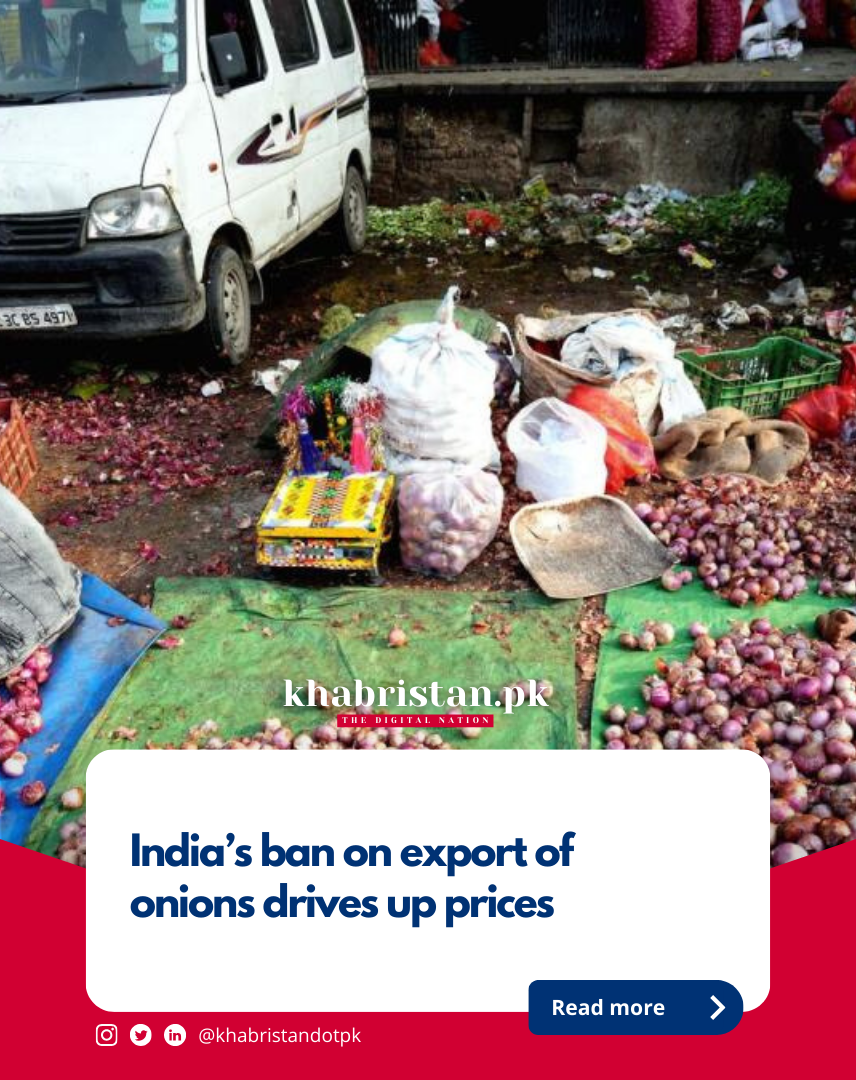India’s ban on exporting onions has caused a spike in prices for Asian buyers. This has led to a search for cheaper alternatives as traditional importers such as Bangladesh and Malaysia now face high prices. The ban is not expected to be lifted before general elections next year, impacting various Asian countries’ access to onions for their cooking. – Khabristan.PK

MUMBAI/DHAKA/KATHMANDU: India’s ban on the export of onions has driven up prices of the vegetable for Asian buyers, who are scrambling for cheaper alternatives, particularly as New Delhi is unlikely to lift the curbs before general elections next year.
The world’s biggest exporter of onions banned shipments on Dec. 8 after domestic prices more than doubled in three months following a drop in production.
Now retail shoppers from Kathmandu to Colombo are struggling with high prices, since traditional Asian buyers, such as Bangladesh, Malaysia and Nepal, and even the United Arab Emirates, rely on imports from India to bridge domestic gaps.
“Onions are needed for almost everything we cook,” said Mousumi Akhtar, who works in the private sector in Dhaka, the capital of Bangladesh. “This sudden price hike is tough to swallow. I’ve had to cut back on how much I buy.”
From the belacan shrimp paste of Malaysia and Bangladeshi biryani to chicken chillies in Nepal or Sri Lankan fish curry, Asian consumers have built up a serious dependence on Indian supplies of onions to lend spice to their favourite dishes.
Traders estimate that India accounts for more than half of all imports of onions by Asian countries. Its shorter shipment times against those from rival exporters such as China or Egypt, are key to preserving the taste of the perishable commodity.
India exported a record 2.5 million metric tons of onions in the financial year that ended on March 31, with 671,125 tons going to neighbouring Bangladesh, its biggest buyer of the vegetable.
To overcome the shortage, Bangladesh is trying to source more from China, Egypt and Turkey, said commerce ministry official Tapan Kanti Ghosh.
As general elections approach next month in Bangladesh, the government has begun selling onions at subsidised prices to the poor, hoping to offset a surge of more than 50% in prices after India’s ban.
Even worse is the situation in landlocked Nepal, which imports most of its onions.
“Since the ban by India, we have monitored the supply situation at different places. There are no onions on sale,” said Tirtharaj Chiluwal, an official of the Himalayan nation’s commerce ministry.
Nepal is considering imports from China and may ask India to make an exception and allow exports, said ministry spokesperson Gajendra Kumar Thakur.
LIMITED OPTIONS
Importing nations have to contend with more expensive supplies from China, Iran, Pakistan and Turkey, which have all hiked prices since India is out of the market, said Ajit Shah, an Indian exporter.
All would run out of supplies if India’s ban lasted for an extended period, said one exporter based in Mumbai, the financial capital.
Within a week after the ban, onions became 20% cheaper in India as supplies from the new season’s crop came in, traders said.
Now, with domestic supplies more than adequate to satisfy demand at home, Shah, the exporter, said India should allow exports to maintain its global market position.
But the curbs are unlikely to go before next year’s general elections, as the priority of Prime Minister Narendra Modi’s government is to hold down food prices, the Mumbai-based exporter said.
New Delhi has also reined in exports of rice, sugar and wheat.
Since India’s ban, onion prices have nearly doubled in Sri Lanka, which is slowly emerging from its worst financial crisis in nearly seven decades.
Malaysia, like other importers, is also trying to secure supplies from China and Pakistan, said Seri Mohamad Sabu, its agriculture minister.
The recent decision by India to ban the export of onions has sent shockwaves through the global onion market, leading to significant price increases across various regions. As one of the largest producers and exporters of onions, India’s policy shift has had far-reaching implications, leaving consumers and businesses around the world grappling with the repercussions. The ban, driven by concerns over domestic shortages and price hikes, has disrupted established supply chains and dynamics, prompting import-dependent countries to seek alternative sources and navigate the resulting price volatility. The sudden escalation in onion prices serves as a stark reminder of the interconnectedness of global agricultural markets and the ripple effects of policy decisions in one region on the broader economy. While the immediate focus remains on stabilizing prices and mitigating market disruptions, the incident underscores the need for greater resilience and diversification in food supply chains to cushion against such unforeseen shocks in the future.
Keywords: India, onion export ban, price increase, Asian buyers, import alternatives, impact on Nepal and Bangladesh, global market position
Summary:
India’s ban on onion exports has led to a surge in prices for Asian buyers, impacting countries like Bangladesh, Nepal, and Sri Lanka. The ban, driven by domestic price hikes and reduced production, has forced import-dependent nations to seek alternatives from China, Egypt, and Turkey. Bangladesh has turned to subsidised sales to mitigate the price surge, while Nepal faces a shortage and is considering imports from China. With limited options and increased prices from other suppliers, the ban’s impact has reverberated across the region, prompting calls for India to reconsider its export restrictions.
Disclaimer:
This content is AI-generated using IFTTT AI Content Creator. While we strive for accuracy, it’s a tool for rapid updates. We’re committed to filtering information, not reproducing or endorsing misinformation. – Khabristan.pk for more information visit privacy policy








Leave a Comment